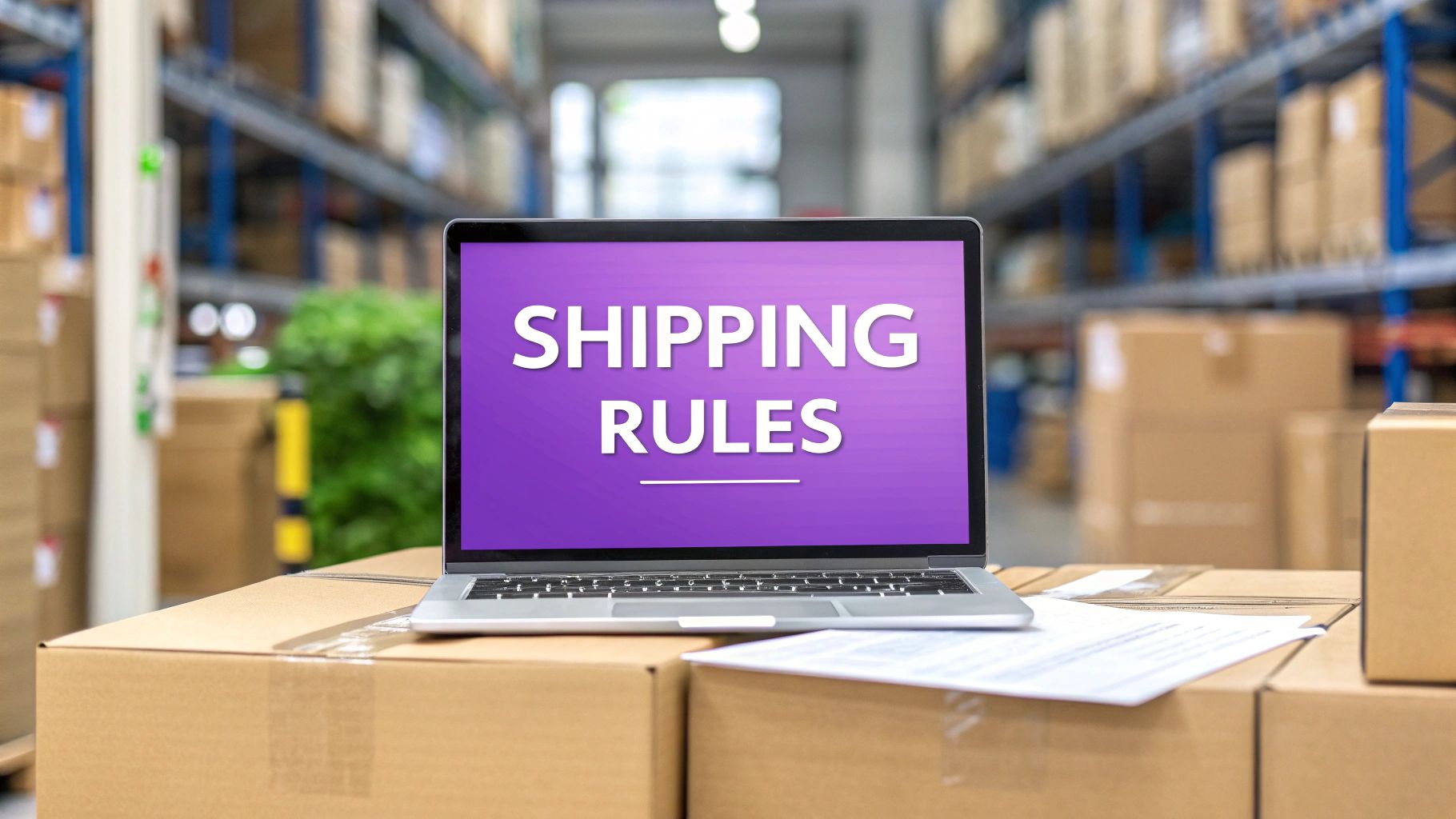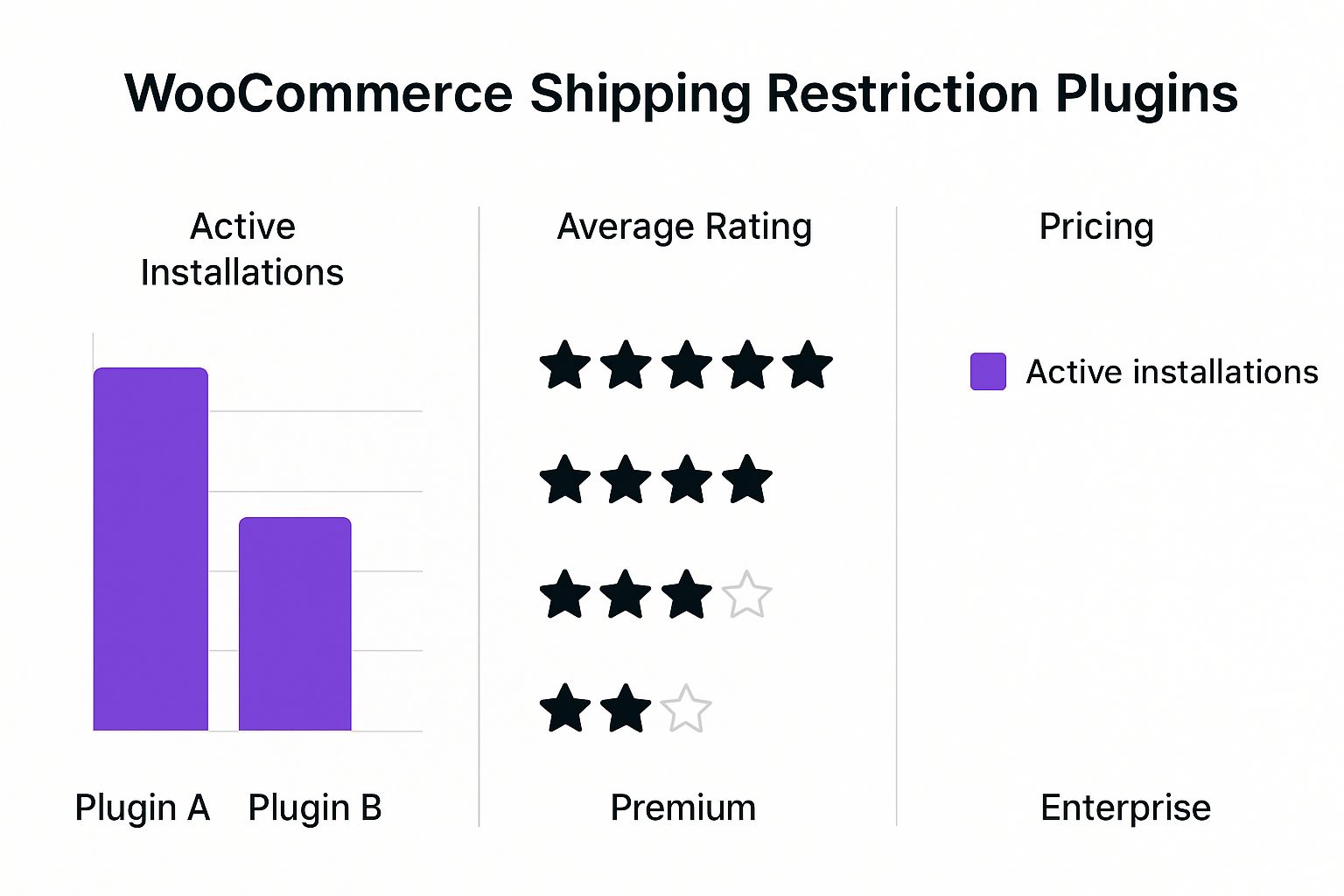
Best Shipping Restriction Plugins for WooCommerce: Comparison Guide
Explore the best shipping restriction plugins for WooCommerce in our comprehensive comparison guide. Find the ideal tool for your store today!
Cody Y.
Updated on Sep 8, 2025
Here’s the thing about shipping restriction plugins for WooCommerce: they really fall into two main camps. On one side, you have the highly specialized compliance tools built to handle complex legal and product-specific rules. On the other, you have the all-in-one solutions that offer broader conditional logic for all sorts of e-commerce scenarios.
So, the choice really boils down to what you need more: deep, automated control over regulatory minefields, or a versatile toolkit for marketing-driven shipping rules.
Why Your WooCommerce Store Needs Shipping Rules
Trying to run a WooCommerce store without a solid set of shipping rules is like driving on the highway with a blindfold on. Sure, a one-size-fits-all shipping strategy might get you by for a little while, but it quickly becomes a leaky bucket of lost profits, compliance headaches, and logistical nightmares.
As your store grows, you just can't keep up by checking orders manually. It's not sustainable.
A dedicated plugin turns your shipping process from a constant worry into a genuine strategic advantage. It gives you the fine-grained control you absolutely need to protect your business and, just as importantly, give your customers a much better experience.
The Problem With Standard Shipping Setups
Without automated restrictions, you're leaving the door wide open to a ton of preventable problems that drain your time, money, and reputation. Imagine a customer in a state where you can't legally ship a product easily placing an order. Now you're stuck canceling it, issuing a refund, and dealing with a justifiably frustrated buyer.
These aren't just hypotheticals; they're common, costly scenarios that happen every day:
- Legal Compliance: If you sell products like alcohol, firearms, or even certain agricultural goods, you have to follow a dizzying web of state, county, and sometimes even city laws. One slip-up can lead to hefty fines or serious legal trouble.
- Logistical Nightmares: Shipping perishable items across the country is a recipe for spoiled goods and refund demands. Likewise, trying to ship heavy or fragile items to remote areas can be a complete money pit.
- Profit Erosion: That simple flat shipping rate looks great until you're sending a bulky order to a distant shipping zone with sky-high carrier fees. Your margins can get wiped out in an instant.
Take a look at a standard WooCommerce product page. It's clean and does a great job of selling, but it has zero built-in logic to handle any of these complex shipping challenges.

The interface is great for getting customers to click "Add to Cart," but the backend simply can't stop a prohibited purchase before it happens.
The heart of the problem is that default WooCommerce only validates shipping rules at the very last step of checkout. A proper shipping restriction plugin jumps in way earlier, stopping an invalid order from ever being placed in the first place.
Building or fine-tuning your e-commerce store means getting the foundation right, which is just as critical as the tools you add on top. For more on that, there are some great resources on choosing the best CMS for your small business.
The need for these plugins is only growing as the platform continues to dominate. As of 2025, WooCommerce powers an estimated 33.4% of all tracked e-commerce sites, which translates to over 4.5 million active stores. That's a huge number of businesses facing these exact same shipping challenges.
How We Broke Down The Top Plugins
To give you a genuinely useful comparison of the best shipping restriction plugins, we had to go way beyond just listing features from a sales page. Our goal was to create a clear, honest framework for evaluating these tools, making sure our analysis is structured, objective, and tied directly to the real-world headaches e-commerce businesses face every day.
This way, you can see what actually matters when you're picking a plugin.

We built our review process on four core pillars. These are the things that determine a plugin’s real value and how it will actually perform in a live store. By sticking to these benchmarks, we can offer a comparison that is both fair and deeply practical.
Our Core Evaluation Criteria
We zeroed in on the following key areas, which we believe are the most critical aspects of any shipping restriction tool:
- Rule Granularity: We looked at how deep each plugin lets you get with your rules. This isn't just about country or state—we checked for restrictions by city, ZIP code, product category, weight, and even customer details like user role or order total. High granularity means you have pinpoint control over every possible shipping scenario.
- Conditional Logic: Simple rules are one thing, but the real power comes from sophisticated conditional logic. Can you stack multiple conditions with "AND/OR" logic? For example, can you block a product category only for customers in California and only when the cart subtotal is under $100? This is the engine behind truly automated shipping decisions.
The difference between an average plugin and a great one is its ability to handle complex, multi-layered "if-then" scenarios without forcing you to write custom code. That's where you unlock real automation.
- User Experience (UX): A powerful tool is worthless if it's a nightmare to configure. We put a heavy emphasis on the user interface, especially for store owners who aren't developers. Is creating a rule a simple, logical process, or do you have to click through a maze of confusing menus? A clean UI dramatically cuts down on setup time and prevents costly mistakes.
- Performance and Integration: Finally, we considered how the plugin plays with the rest of your store. Does it work smoothly with other key extensions, like table rate shipping plugins or fulfillment services? More importantly, does it slow down your checkout? A well-coded plugin should do its job in the background without adding any noticeable lag, which is absolutely critical for keeping conversions high.
Comparing The Best WooCommerce Shipping Restriction Plugins
Alright, let's get into the main event: putting the top WooCommerce shipping restriction plugins head-to-head. My goal here isn't just to list features. I want to give you a real-world analysis of how these tools actually perform, so you can see past the marketing and understand what it’s like to use them day-to-day. We’ll break down each one based on the criteria that matter most.
This isn't about finding a single "best" plugin, but finding the right plugin for your specific store. Whether you’re trying to stay compliant with complex laws or get creative with shipping promotions, one of these tools is going to be a much better fit than the others. Let’s see how they stack up.
The image below gives you a quick visual overview of our top picks, comparing things like active installs, user ratings, and general price points.

You can immediately see how different their market positions are. Some have huge user bases, while others are clearly built for a more focused, specialized audience.
Ship Restrict: The Compliance Specialist
Ship Restrict was built from the ground up for one primary reason: to keep stores in legally sensitive industries out of trouble. Think firearms, alcohol, or other regulated products. Its focus isn't on marketing gimmicks; it's about creating a bulletproof compliance system that stops illegal sales before they even have a chance to happen.
The interface is clean and gets straight to the point. It’s designed for efficiency, not for endless customization. You won't find options for creating promotional rules based on cart value, because that’s not what it’s for. Instead, all its power is channeled into creating incredibly specific geographic restrictions.
Key Differentiator: Ship Restrict’s superpower is its bulk rule management. You can upload a CSV of restricted ZIP codes and generate hundreds of rules in seconds. For anyone dealing with city- or county-level regulations, this feature alone can save countless hours of mind-numbing data entry.
Performance Breakdown:
- Rule Granularity: This is where Ship Restrict absolutely dominates. It lets you restrict shipping by state, county, city, and even individual ZIP codes. This kind of precision is non-negotiable for industries where laws can change from one town to the next.
- Conditional Logic: The logic is simple but powerful for its intended purpose. It’s all about combining geographic conditions (e.g., State AND City) rather than complex cart conditions. It’s not built for rules like "restrict shipping if the cart has product X and the subtotal is under $50."
- User Experience: The UX is highly streamlined for compliance managers and FFL holders. The bulk-add feature is a game-changer, and the dashboard gives you a clear, auditable overview of every active restriction.
- Performance: It was built to be lightweight. The plugin runs its checks without adding any noticeable drag to your checkout process, which is critical for preventing cart abandonment.
If your number one priority is avoiding expensive legal headaches, this is your plugin.
Conditional Shipping for WooCommerce: The All-Around Powerhouse
Conditional Shipping for WooCommerce takes a completely different tack. It’s more like a Swiss Army knife, designed to handle a massive range of shipping scenarios, from simple location blocks to intricate, marketing-driven rules. This plugin is for the store owner who wants total control over every possible shipping outcome.
It provides a much wider set of conditions to work with, including cart subtotal, weight, item count, user role, and specific products or categories. This flexibility is a core reason why so many small and medium-sized businesses gravitate towards it, as they often have diverse shipping needs across different zones and product types.
Key Differentiator: Its core strength is the powerful "AND/OR" conditional logic engine. This lets you stack multiple, unrelated conditions to create incredibly specific rules that can serve both logistical and marketing goals.
Performance Breakdown:
- Rule Granularity: It handles location-based rules (country, state, postcode) well, but it really shines at the product level. You can even restrict shipping for a single product variation, a must-have feature for stores with complex catalogs. To see this in action, check out our guide on how to restrict shipping by product in WooCommerce.
- Conditional Logic: This is where the plugin pulls away from the pack. You could, for example, create a rule that disables free shipping for wholesale users (user role) in Alaska (state) on any order containing bulky items (shipping class). That multi-layered logic is what makes it so capable.
- User Experience: With great power comes a steeper learning curve. The interface is packed with options, and setting up your first few rules can feel a bit intimidating. Once you get the hang of the logic, however, it becomes an incredibly versatile tool.
- Performance: If you build a large number of complex rules, you might see a minor impact on checkout speed. It’s important to keep your rule set clean and efficient to avoid any performance hits.
This tool is the clear winner for store owners who need maximum flexibility to craft custom shipping logic for just about any scenario imaginable.
ELEX WooCommerce Shipping Calculator, Plugin & Hide Shipping Methods: The Feature-Rich Toolkit
The ELEX plugin is positioned as an all-in-one shipping management suite. Shipping restrictions are just one piece of a much larger puzzle that includes a shipping calculator, packaging algorithms, and the ability to hide methods based on rules.
It's less of a dedicated restriction tool and more of a complete shipping overhaul. This plugin is for merchants who need to control not just if a method is shown, but also how its price is calculated and displayed to the customer.
Key Differentiator: The standout feature is its tight integration of shipping rate calculations with restriction rules. You can hide a specific shipping method until a cart meets certain criteria, and then pull in real-time rates from carriers like UPS or FedEx.
Performance Breakdown:
- Rule Granularity: It offers a solid range of rules based on location, product weight, category, and shipping class. It isn't as hyper-focused on micro-locations as Ship Restrict, but it covers the vast majority of e-commerce use cases perfectly well.
- Conditional Logic: The logic is robust, allowing you to combine multiple conditions effectively. A great use case is creating rules to hide specific carrier services (like "UPS Ground") for orders over a certain weight or dimension, which helps you manage costs on oversized items.
- User Experience: Because it packs so many features into a single plugin, the interface can feel a bit cluttered. It takes some time to get used to navigating between rate adjustments, packaging settings, and restriction rules.
- Performance: As a feature-heavy plugin that often makes external API calls to carriers for rates, it has a higher potential to impact site performance. A solid hosting environment and proper caching are a must when using this tool.
This plugin is the go-to choice for businesses that need to manage complex, real-time shipping calculations right alongside their restriction rules.
Solving Real-World Shipping Challenges
It’s one thing to look at a feature list, but it’s another thing entirely to see how these shipping plugins solve the messy, real-world problems that WooCommerce store owners face every day. The true value of these tools isn't buried in a settings menu; it's in their power to automate tricky logistics, stop expensive shipping errors before they happen, and ultimately, protect your bottom line.
Let's walk through a few practical scenarios where a solid shipping restriction plugin becomes absolutely essential.

By breaking down these use cases, you can see how an abstract set of rules can translate into a concrete solution for your store's unique shipping headaches.
Restricting Perishable Goods to Local Zones
Imagine you run an online bakery selling artisanal cheesecakes. They’re fragile, perishable, and can only survive a one-day transit. Shipping them nationwide is a recipe for disaster—spoiled products, angry customers, and a lot of wasted money.
The Challenge: You have to limit cheesecake sales to customers inside a specific local delivery area, defined by a handful of ZIP codes.
The Plugin Solution:
- Trigger: If a product from the "Perishables" category is in the cart.
- Condition: And the shipping ZIP Code is NOT on your approved list (e.g., 90210, 90211, 90212...).
- Action: Hide the "1-Day Local Delivery" shipping option.
A flexible plugin like Conditional Shipping for WooCommerce is perfect for this. Its strength lies in combining conditions like product categories and specific ZIP code lists, giving you precise control over where your delicate items can go so they always arrive fresh.
Blocking PO Box Deliveries for High-Value Orders
Your store sells high-end electronics, and you wisely use a courier that requires a signature for all orders over $500. The problem? These couriers can't deliver to P.O. Boxes. When a customer inevitably places a large order with a P.O. Box address, it grinds fulfillment to a halt. You're stuck emailing the customer for a physical address, delaying the shipment and creating a poor experience.
The Challenge: You need to automatically prevent signature-required shipping methods from showing up for any P.O. Box address.
The Plugin Solution:
- Trigger: If the cart total is over $500.
- Condition: And the shipping address line contains "P.O. Box" or "PO Box".
- Action: Hide the "Signature Courier" method and show a message like, "Please provide a physical address for high-value orders."
This is a classic example of why address line scanning is so important. A plugin that can spot specific text strings in the address field is a lifesaver, catching these problem orders before they ever become a customer service ticket.
The ELEX plugin is a strong candidate here. Its feature set is robust enough to handle rules based on the content of an address line, letting you automatically filter out P.O. Box destinations that clash with your shipping policies.
Navigating State-by-State Hazardous Materials Regulations
Let's say your business sells specialty batteries, which are classified as hazardous materials. Due to complex state laws, you are legally forbidden from shipping them to California and New York. An accidental shipment to either state could land you in hot water, facing massive fines and legal headaches.
The Challenge: You have to completely block the purchase of specific products for customers in restricted states. No exceptions.
The Plugin Solution:
- Trigger: If the cart contains the "Lithium Battery Pack" product.
- Condition: And the shipping state is "California" OR "New York".
- Action: Disable all shipping methods, making checkout impossible.
For this kind of mission-critical, compliance-driven rule, Ship Restrict is the ideal tool. It was built from the ground up for exactly these types of geographic and product-based legal restrictions. Its focused design ensures these rules are enforced without fail, protecting your business from regulatory blowback. This is particularly crucial in highly regulated industries. For a deeper dive, our guide on CBD and hemp shipping restrictions in WooCommerce explores how to manage these complex scenarios.
Looking at these specific situations, you can start to see which plugin’s strengths align best with the challenges you’re actually facing. The right tool doesn't just give you more settings to fiddle with; it solves real, costly problems.
How To Choose The Right Plugin For Your Store
Picking the right WooCommerce shipping restriction plugin isn’t about finding a single "best" tool. It’s about matching the right tool to your business, your technical comfort, and where you plan to grow. As our comparison shows, each plugin really shines in a specific area. The final decision is all about aligning those strengths with your store’s unique needs.
Think of this as a framework for moving from a simple comparison to a confident choice. I'll break down my recommendations for different types of businesses, so you can invest in a solution that solves today's problems without creating tomorrow's headaches. While you're thinking about plugins, it's also a good idea to explore the vast world of WordPress plugins to see how they can improve other parts of your site, not just shipping.
The Top Choice For Complex Compliance
If you're selling in a heavily regulated industry—think firearms, alcohol, or specialty goods with a patchwork of state-by-state laws—your number one priority is airtight compliance. You need a tool built from the ground up to prevent illegal sales, where getting rules right down to the ZIP code is absolutely non-negotiable.
Recommendation: Ship Restrict is the clear leader here. Its entire feature set, from bulk ZIP code rule creation to its clean, compliance-first interface, is designed to minimize your legal risk. It doesn't try to be a jack-of-all-trades; it focuses on precision and reliability. To see this in action, you can learn exactly how to block shipping to specific states with WooCommerce plugins.
The Best Plugin For All-Around Flexibility
Maybe your store's needs are more varied. You might need to block P.O. boxes for some products, offer special rates for wholesale customers, and run promotions based on cart contents—all at the same time. If that sounds like you, you need a plugin with powerful, multi-layered conditional logic to handle every possible scenario.
Recommendation: Conditional Shipping for WooCommerce is the standout for ultimate flexibility. Its "AND/OR" logic engine is a beast, letting you stack different conditions (like cart total, user role, and shipping class) to build incredibly sophisticated rules for both logistics and marketing.
The Most Powerful Option For Integrated Solutions
For some businesses, just restricting shipping isn't enough. You need a system where those restrictions are deeply connected to live rate calculations from carriers. This is for stores managing complex packaging logic, multiple carrier services, and conditional rates, all from one dashboard.
Recommendation: The ELEX plugin suite is the best fit for this integrated approach. It marries its restriction features with a powerful shipping calculator. This makes it perfect for hiding or showing specific carrier services based on what's in the cart, all while pulling real-time rates.
Before you commit to any plugin, always use its free trial or money-back guarantee. Spin up a staging site and test your most critical, real-world scenarios. This is the final gut check to ensure the plugin doesn't just look good on paper but actually works flawlessly in your store's environment.
This careful selection process is more important than ever as the e-commerce world gets more competitive. The constant pressure from platforms like Shopify forces WooCommerce plugin developers to keep innovating. That dynamic ensures that shipping restriction tools will only become more crucial as global e-commerce regulations get more complex, a trend you can read more about at Barn2 Plugins.
Frequently Asked Questions
When you're digging into shipping restriction plugins for WooCommerce, a few practical questions always come up. From checkout speed to customer communication, getting these details right is the difference between a smooth setup and a frustrating one. Let's tackle the most common questions we hear from store owners.
Can Shipping Restriction Plugins Slow Down My Checkout?
A well-built plugin shouldn't slow you down. The good ones are coded to be lightweight, running their checks in the background so efficiently that neither you nor your customer will ever notice.
That said, performance can take a hit if you're using a poorly coded plugin or building hundreds of incredibly complex, layered rules. The more work you make the server do to calculate shipping, the higher the chance of a minor delay. This is especially true if the plugin relies on outside API calls.
To keep your checkout snappy:
- Pick a Reputable Plugin: Stick to tools with solid reviews and a reputation for clean, efficient code.
- Keep Rules Simple: Don't overcomplicate things. Avoid redundant or unnecessarily complex rules that could be streamlined.
- Invest in Good Hosting: A fast server is your best defense against almost any performance issue.
- Test Your Speed: Use a tool like GTmetrix to benchmark your checkout speed before and after activating a plugin. It’s the only way to know the real impact.
Will These Plugins Work With My Other Shipping Extensions?
For the most part, yes. Compatibility is rarely an issue with mainstream tools. The top-tier restriction plugins are designed from the ground up to play nicely with standard WooCommerce functions and major shipping extensions from carriers like FedEx and UPS, or popular solutions like Table Rate Shipping.
Where you might run into trouble is with niche, custom-coded, or outdated extensions. If you've got a highly customized shipping process, you absolutely need to verify compatibility before you commit.
Always check the plugin’s official documentation for a list of supported integrations. If you don't see your specific extension listed, reach out to the developer’s pre-sales support. A quick email listing your current plugins can save you a world of headaches later on.
How Should I Communicate Shipping Restrictions To Customers?
Clear and early communication is non-negotiable. Nothing frustrates a buyer more than getting all the way to the final checkout step only to be told they can’t complete their order. That’s a guaranteed way to lose a sale.
The best plugins don't just hide a shipping method; they let you display a custom message explaining why it's unavailable. This turns a frustrating dead end into a helpful, transparent experience.
For example: Instead of a shipping option just vanishing, the customer should see a clear note right on the cart or checkout page: "Sorry, we cannot ship this item to California due to state regulations."
These messages need to show up as early as possible—ideally on the cart page. We also highly recommend having a dedicated "Shipping Policy" page on your site that details any major restrictions. This way, customers are fully informed before they even add something to their cart.
Ready to take control of your shipping compliance and stop worrying about costly mistakes? Ship Restrict provides the specialized tools you need to enforce complex shipping rules with precision and ease. Start your risk-free trial today!

Cody Yurk
Founder and Lead Developer of ShipRestrict, helping e-commerce businesses navigate complex shipping regulations for regulated products. Ecommerce store owner turned developer.